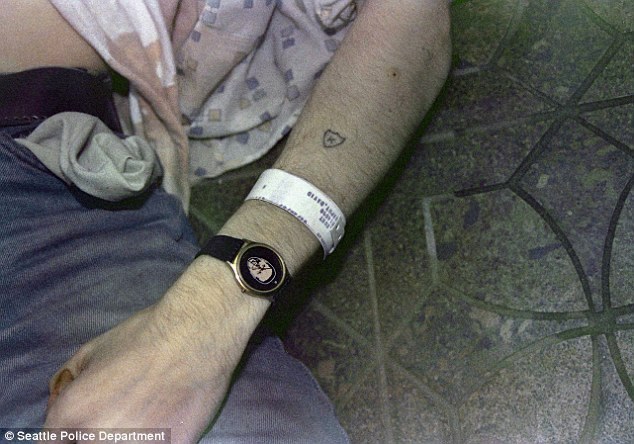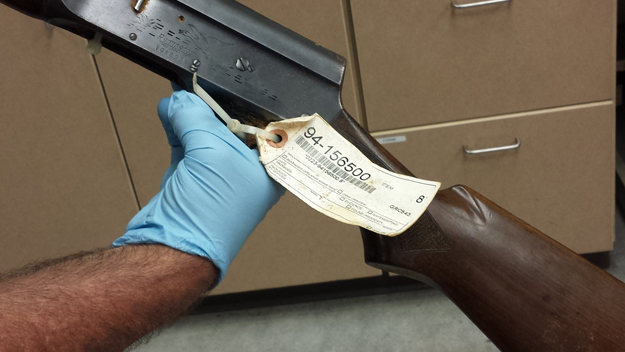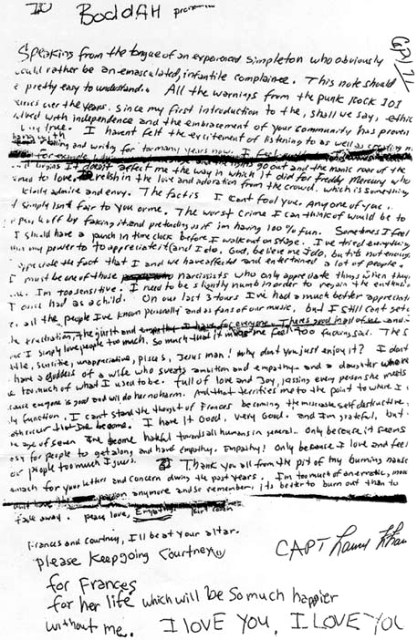

Case Study:
Kurt Cobain and Depression in Creative People
IN THE ARCHIVES:
Preserved
Heavenly Bodies
Open Caskets
The Stanley Hotel
Lizzie Bordon
Autopsy
New death scene photos released HERE, however, they do not contain views of the body other than what is shown here




Thirty five never-before-seen pictures from the death investigation of Kurt Cobain, the rock legend and frontman for the band Nirvana who was found dead in his Seattle-area home in April 1994, were released by the Seattle Police Department in March 2014.
The photographs taken at the scene at the time of Cobain's death remained undeveloped until recently. The department announced it had developed the film as part of a re-examination of the rock star's death investigation, which confirmed it was a suicide.
New images were also released in March of 2016, depicting the shotgun police say Cobain used to kill himself.
In this photo, Kurt Cobain's arm shows his medical bracelet from a drug rehab center in LA that he checked out of, days before returning to Seattle, where the Seattle Police Department says he committed suicide.
Credit: Seattle Police Department and CBS HERE
See Kurt Cobain's biography HERE
What is known as the "27 Club?" See information about it HERE
Photo of the hand-written suicide note

What the sucicide note said
To Boddah
Speaking from the tongue of an experienced simpleton who obviously would rather be an emasculated, infantile complain-ee. This note should be pretty easy to understand.
All the warnings from the punk rock 101 courses over the years, since my first introduction to the, shall we say, ethics involved with independence and the embracement of your community has proven to be very true. I haven't felt the excitement of listening to as well as creating music along with reading and writing for too many years now. I feel guity beyond words about these things.
For example when we're back stage and the lights go out and the manic roar of the crowds begins., it doesn't affect me the way in which it did for Freddie Mercury, who seemed to love, relish in the the love and adoration from the crowd which is something I totally admire and envy. The fact is, I can't fool you, any one of you. It simply isn't fair to you or me. The worst crime I can think of would be to rip people off by faking it and pretending as if I'm having 100% fun. Sometimes I feel as if I should have a punch-in time clock before I walk out on stage. I've tried everything within my power to appreciate it (and I do,God, believe me I do, but it's not enough). I appreciate the fact that I and we have affected and entertained a lot of people. It must be one of those narcissists who only appreciate things when they're gone. I'm too sensitive. I need to be slightly numb in order to regain the enthusiasms I once had as a child.
On our last 3 tours, I've had a much better appreciation for all the people I've known personally, and as fans of our music, but I still can't get over the frustration, the guilt and empathy I have for everyone. There's good in all of us and I think I simply love people too much, so much that it makes me feel too fucking sad. The sad little, sensitive, unappreciative, Pisces, Jesus man. Why don't you just enjoy it? I don't know!
I have a goddess of a wife who sweats ambition and empathy and a daughter who reminds me too much of what i used to be, full of love and joy, kissing every person she meets because everyone is good and will do her no harm. And that terrifies me to the point to where I can barely function. I can't stand the thought of Frances becoming the miserable, self-destructive, death rocker that I've become.
I have it good, very good, and I'm grateful, but since the age of seven, I've become hateful towards all humans in general. Only because it seems so easy for people to get along that have empathy. Only because I love and feel sorry for people too much I guess.
Thank you all from the pit of my burning, nauseous stomach for your letters and concern during the past years. I'm too much of an erratic, moody baby! I don't have the passion anymore, and so remember, it's better to burn out than to fade away.
Peace, love, empathy.
Kurt Cobain
Frances and Courtney, I'll be at your alter.
Please keep going Courtney, for Frances.
For her life, which will be so much happier without me.
I LOVE YOU, I LOVE YOU!
It seems like there is a statistically high level of writers, poets, artists, actors and musicians who suffer from depression. That led me to ask this question:
IS THERE A LINK BETWEEN CREATIVITY AND DEPRESSION?
A growing body of research suggests that there is merit to that popular assumption. Depression may lurk where creativity lies.
The dark side of creativity
Psychologists have been fascinated by the potential link for decades. The earliest and most rudimentary studies examined eminent people across fields including literature and the arts.
These studies found that creatives had an unusually high number of mood disorders. Charles Dickens, Tennessee Williams, and Eugene O'Neill all appeared to suffer from clinical depression. So too did Ernest Hemingway, Leo Tolstoy and Virginia Woolf. Sylvia Plath famously took her own life by sticking her head in an oven while her two children slept.
Critics rightly pointed out that these studies focused on very specific groups of high-achievers, and that they relied on anecdotal evidence.
Subsequent studies have cast the net wider. Simon Kyaga led a team of researchers at Sweden's Karolinska Institute.
Using a registry of psychiatric patients, they tracked nearly 1.2 million Swedes and their relatives. The patients demonstrated conditions ranging from schizophrenia and depression to ADHD and anxiety syndromes.
They found that people working in creative fields were 8% more likely to live with depression than the general population.
Scott Barry Kaufman, an American psychologist and writer for Scientific American, has said: "It seems that the key to creative cognition is opening up the flood gates and letting in as much information as possible," he writes. "Because you never know: sometimes the most bizarre associations can turn into the most productively creative ideas."
Clearly some people suffer for their art, and clearly some art stems from suffering. But however they feel, happy or depressed...creative people leave their mark on the world with books, paintings, records, films, and other beautiful legacies.
Source: CNN
From Creative Something
To start: if depression affects so many diverse groups of people, why are creative types singled out? What’s the link between the two?
While the possible solutions are many (the mind is a very complicated subject, after all), countless psychologists and psychiatrists tend to agree that major depression is amplified in those who tend to ruminate on their thoughts.
Think about this.
Rumination, if you’ve been paying attention, is one of the major keys of thinking like a creative genius. To be creative is to make sense of and connect the small details of everything we experience, the good and the bad.
Creatives naturally tend to think more, and think about their very thoughts too.
When we ruminate, however, our brains are naturally drawn to things that are vital to our health. Pain and suffering are such immense experiences, even if they’re short-lived, that those who ruminate tend to loop through those painful experiences more often than those who don’t (are you starting to see the evolutionary link yet?).
For example: someone who doesn’t take the time to think about their thoughts regularly may have a stressful day at work or school, but when they come home from it all it’s easier to forget than not.
On the other hand, there are certain types of thinkers who naturally are drawn to play the stressful events over and over again, thinking about what happened, what they could have (or should have) done differently, how the details of what occurred will affect the rest of their lives, and so on. Creative thinkers tend to fall into the latter group, re-playing events over and over again to better understand them.
A result of focusing on these thoughts then, according to Yale psychologist Susan Nolen-Hoeksema, is immense depression or a feeling of hopelessness.
Aha! Now we’re onto something.
This rumination to depression process is evident not only in creatives, of course, but everyone. If the average (not powerfully creative) person finds themselves in a moment of deep reflection – particularly about a stressful event – they too are likely to encounter a state of depression, though it may not last as long as someone who continues to ruminate on the event(s).
For creatives, that depressive state happens to be longer-lasting and more intense, due to their innate desire to simply keep thinking on it.
See the entire article HERE